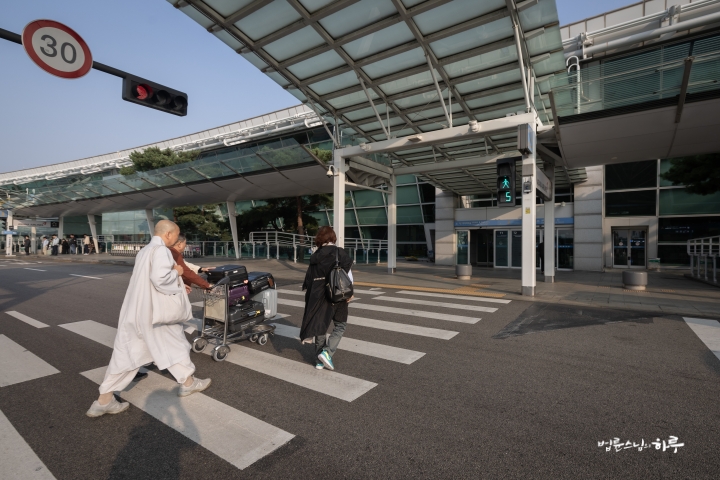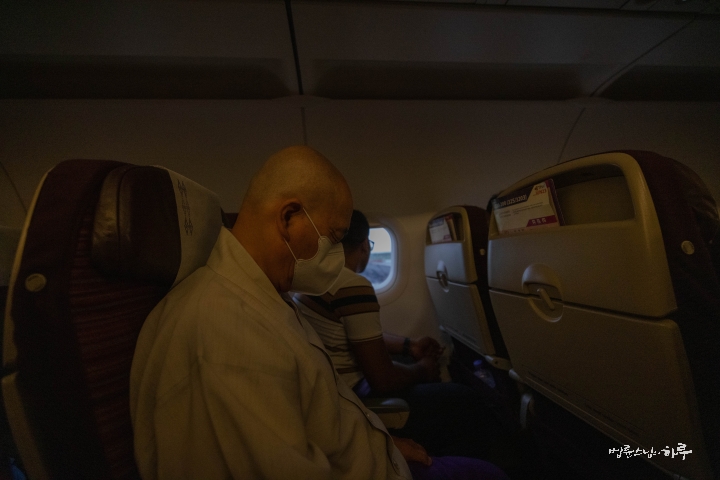Jun 4, 2025. Day 1 of Laos Visit
Hello. Starting today, Sunim will be visiting Laos for three days. The overseas schedule began immediately after the 100-Day Dharma Talk ended.
After completing morning practice and meditation, Sunim departed from Seoul Jungto Center at 4 a.m. and headed to Incheon Airport. When he opened his phone in the car, breaking news about the results of the 21st presidential election appeared. After checking the election results, Sunim headed to the departure check-in counter at Incheon Airport.


After completing departure procedures, the morning sun rose while waiting at the boarding gate. The plane departed from Incheon Airport at 6:45 a.m., flew for 5 hours and 10 minutes, and landed at Ho Chi Minh Airport in Vietnam at 9:55 a.m. local time.


After staying at Ho Chi Minh Airport for 6 hours, the flight to Vientiane Airport in Laos was scheduled to depart at 4:10 p.m., but the departure was continuously delayed, and the plane finally took off at 9 p.m. He had waited at the airport for more than 10 hours. After flying for 1 hour and 35 minutes, he arrived at Vientiane Airport at 10:30 p.m. local time. All scheduled evening activities were canceled. It was midnight when he arrived at the accommodation. It took about 22 hours to reach Laos after leaving Jungto Center at 4 a.m.

Using budget airlines resulted in flight delays and long waiting times at transit points, consuming the entire day. However, Sunim didn’t mind, saying, “I’m grateful we could arrive today.”

After arriving at the accommodation, he unpacked, briefly discussed tomorrow’s schedule, edited manuscripts, and concluded the day’s activities.
Since there was no Dharma talk today, I’ll share a conversation between Sunim and a questioner from the Friday Dharma Q&A held at Jungto Social and Cultural Center on the 30th of last month.
My Child Apologizes for Dropping Grades. What Am I Doing Wrong?
“Your children say these things because they feel sorry seeing their mother living alone. They want to comfort you, so they say such things. They think a lot on their own, like ‘I should study well so Mom feels rewarded’ or ‘I should earn lots of money to help Mom.'”
The good thing is that because the children see their mother as pitiful, they grow up properly without going astray. In such situations, you should say, ‘What’s important is that you’re healthy; whether you study well or not comes second’ or ‘Earning lots of money is good, but what makes Mom happy is you living healthily.’ This kind of encouragement helps the child to some extent.
However, there’s a more fundamental solution. You need to change the perception that makes you appear pitiful to your children. If you live happily and confidently even without their father, their feelings of guilt will gradually disappear. You need to make your children think, ‘Mom would be fine even without us.'”
“So if I live joyfully and cheerfully in everything, will I be less of a burden to my children?”
“That’s right. If the children think, ‘Mom would live well even without us,’ it reduces their burden. But if they think, ‘If we do something wrong, Mom will have a harder time,’ then you become a heavy burden to your children. To put it nicely, they’re being filial, but to put it negatively, you’re becoming a burden to your children.”
When parents frequently tell their children, ‘I’ve done so much for you,’ the children feel they must repay that debt and carry a burden. Korea has improved compared to the past, but in countries like India or Vietnam, many children live with heavy family responsibilities. When entire families focus on educating just the eldest son and even send him abroad to study, that child can’t live freely. He thinks he must study hard and earn lots of money to support the family. You could call it success, but it’s also like putting up a big fence around human freedom. While it might seem nice to you that they’re being filial, if it’s not a spontaneous feeling for the children, it’s just a heavy burden. That’s why I don’t think it’s particularly good.
If my parents had placed a heavy burden on me, it would have been difficult to become a monk. My parents were rural people who didn’t even finish elementary school. I received their love but didn’t owe them much. Since I lived independently after graduating elementary school, becoming a monk was somewhat easier. If they had sold their fields to pay for my education through university, I would have felt a heavy burden to repay my debt to them.
If you want your children to live freely, you need to let go of the transactional mindset. Thinking ‘I’m investing in you, so pay me back later’ is just a simple business transaction. Then, both marital relationships and parent-child relationships become transactions, not love. I’m not denying your family, but explaining how minds actually work.
Don’t be too attached to your children; just provide meals and take care of basic needs. And tell them, ‘Mom likes it when you study well, but what’s more important is your health.’ It would be a lie to say they don’t need to study. Studying well is good. But what’s more important is that the child is mentally and physically healthy. So tell your child this:
‘What’s more important than earning lots of money is living healthily. Mom is happier when you live your life well than when you earn money for me. So live your lives freely.’
But if you still appear pitiful, such words won’t mean much. If you live cheerfully, become a Jungto Society member, volunteer, and contribute to society, your children will think, ‘Our mom would be fine without us. She’s okay without Dad.’ If you need a man, date someone and introduce him to your children, saying, ‘Mom is doing well like this, so don’t worry about me and live your own lives.’ Or even without a man, if you just show them you’re living confidently without appearing pitiful, your children’s burden will gradually lighten.”
“I think I understand why my children worried even though I kept telling them I was fine. Thank you, Sunim.”
“In the feudal society of the past where gender discrimination was severe, a woman without a husband meant falling into the socially vulnerable class. At that time, women weren’t treated as people. Everything was distributed based on men, so not having a husband was no different from belonging to the poorest class. Even wealthy women were ignored without husbands. Women couldn’t have power and had to live only under men’s shadow. Culturally, women were considered part of men, and there was even the idea that when a husband died, the wife should die too. The term ‘widow’ sounds respectful, but it actually means ‘a person who hasn’t died yet’ – a sinner who should have followed her husband in death but is living instead. Such terms are inappropriate today and should disappear.”
In today’s era, a woman alone can remarry if she wants to live with a man. Moreover, society has become one where there’s no problem living without a man. So there’s no need to have an inferiority complex or endure insufficiency. If you need a man, meet one freely; if not, live alone confidently. There are people who live alone their whole lives doing volunteer work, and others who marry and have children. Having already lived such a life, is it really meaningful to endure new inconveniences? Now you should live with pride in your life. When you live this way, your children will naturally put down their burdens.
When parents suddenly pass away, you feel sad even if told not to. The emptiness in your heart is great. But if parents lie in bed for a long time, the situation changes. If they lie in bed for 3 or 5 years, children can’t properly work or maintain family life, pouring all their energy into caregiving and suffering terribly. When the whole family gathers thinking they’ll pass away this time, but they recover again, and this repeats several times – what happens? Immunity develops through this process. That’s why they say there are no filial children in long illnesses. It means long illness cuts emotional ties.
From the dying person’s perspective, sudden death is most comfortable. But considering those left behind, it’s better to be sick for a while before dying. Because emotional ties need to be cut. So don’t feel too disappointed if your parents passed away suddenly; think of it as good for them instead. Conversely, if your parents suffer from a long illness, understand it as ‘They’re doing this to help us let go.’
Either way is fine. But we cry out when suffering from long illness, and cry out again feeling disappointed by sudden death. This is the problem. These are just phenomena that occur in the world. Sudden death leaves regret, while death after long illness brings hardship – that’s the only difference.

Living alone inevitably has some shortcomings compared to living together. But there’s also comfort in it, isn’t there? Even when a married couple lives in the same house, they have to be mindful of each other. They have to watch each other’s moods, suspicions arise, and when one comes home late, the other has to wake up from sleep – there are many inconveniences. When you live alone, you hardly have to worry about such things.
When a married couple who have been living together are separated due to an overseas assignment, it’s difficult at first. As time passes, they become accustomed to that lifestyle and find it comfortable. Then when they reunite, they actually feel uncomfortable and conflicts may arise. That’s why it’s better for couples to live together without separation if possible. After all, human life is all about habits.
You should try to live more confidently too. Then the heavy burden on your children’s shoulders will naturally be lifted.”
“Thank you. I understand well.”
Tomorrow, Sunim will spend the entire day surveying Laos and conducting scheduled meetings with local people.





